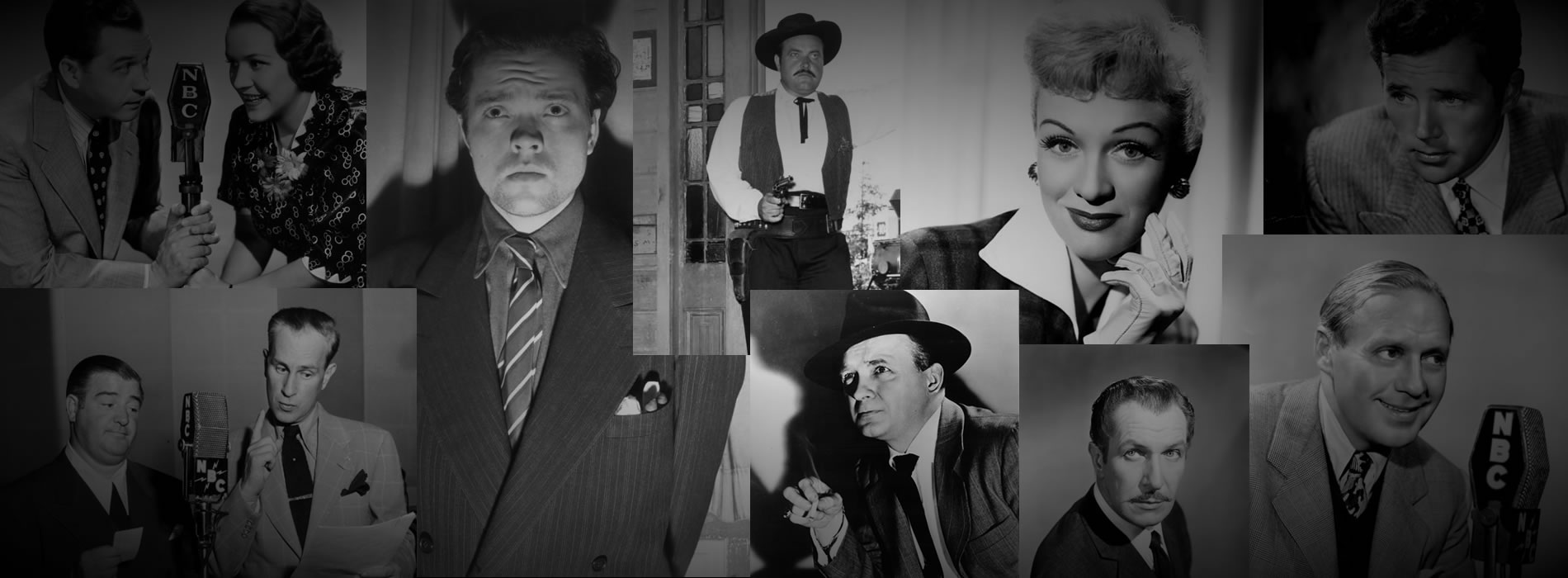
NEWSLETTER | VOL. 4, AUGUST 2021
Welcome to this month’s edition of The Hollywood 360 Newsletter, your place to get all the news on upcoming shows, schedule and interesting facts from your H360 team!
Carl’s Corner
by Carl Amari
Hello everyone – here’s the Hollywood 360 newsletter, August 2021 Vol. 4. As someone on our mailing list, you’ll receive the most current newsletter via email on the first day of every month. If you don’t receive it by the end of the first day of the month, check your spam folder as they often end up there. If it is not in your regular email box or in your spam folder, contact me at carlpamari@gmail.com and I’ll forward you a copy. The monthly Hollywood 360 newsletter contains articles from my team and the full month’s detailed schedule of classic radio shows that we will be airing on Hollywood 360. Each month I’ll write an article on one of the classic radio shows we’ll present on Hollywood 360. The week of August 21st, 2021 we’ll be airing an episode of THE LIFE OF RILEY so here’s my article on this great comedy series and a photo of Irving Brecher and Groucho Marx.
THE LIFE OF RILEY: Which Father Knows Best?
Irving Brecher, the creator of the popular family sitcom The Life of Riley, was a good friend. Irving once told me that, in the late 1930s, his lifelong friend Groucho Marx asked him to create a radio situation comedy show around him. Groucho wanted to play a husband and father of a typical American family. Not wanting to disappoint his good friend, Irving created a proposed radio show called The Flotsam Family. Irving made an audition record with Groucho in the lead and pitched the idea to several advertising agencies. Even though Groucho was a big movie star, the series didn’t sell. Irving told me that the reason it didn’t go over was that advertisers could not envision Groucho, with his grease-paint mustache, rolling eyes and cigar, as the head of a household. A few years later, Irving saw William Bendix in the 1942 film The McGuerins from Brooklyn and felt Bendix would be right for his Flotsam Family radio show.

He changed the name to The Life of Riley and cast Bendix as Chester A. Riley, an inept blue-collar factory worker and father of two. His frequent exclamation of indignation – “What a revoltin’ development this is!” – became a famous catchphrase. The series also benefited from the incredible popularity of a supporting character, Digby “Digger” O’Dell. Digger was the town’s “friendly undertaker” who offered gruesome theories laced with repetitive puns, brilliantly delivered by veteran radio actor John Brown. FYI: The character of Digger became so popular that at one time producers considered a spin-off. In 1949, Universal Studios released a Life of Riley motion picture with many of the radio cast reprising their roles. Later that same year NBC produced a TV version with Jackie Gleason playing Riley – Bendix was under contract to RKO and the company refused him permission to appear on TV. After 26 episodes, Gleason stepped down from the role to pursue other ventures, and Bendix came to an agreement with RKO, playing Riley on television for four seasons. Unlike the radio version, in which daughter Babs and son Junior remained the same age throughout the years, their TV counterparts developed into young adults. Groucho eventually found a radio series that fit him to a tee: You Bet Your Life. It became one of the most successful comedy/quiz shows of all-time and made an equally successful transition to television.
LEND ME YOUR EARS | THIS MONTH’S SONG: PINBALL WIZARD, BY THE WHO
by Lisa Wolf
“It was going to be a complete dud, but I carried on. I attempted the same mock baroque guitar beginning that’s on ‘I’m a Boy’ and then a bit of vigorous kind of flamenco guitar. I was just grabbing at ideas. I knocked a demo together and took it to the studio and everyone loved it.”
~ Pete Townshend
 In 1969, The Who recorded “Pinball Wizard” at Morgan Studios in London. Pinball Wizard is featured on their 1969 rock opera album Tommy. The Who’s Tommy is a rock musical, based on the album. This was the last song written for Tommy. Pete Townshend wrote it when he found out influential rock critic Nik Cohn was coming to review the project. Townshend knew Cohn was a pinball fanatic, so he put this together to ensure a good review. Cohn gave it a great review, and pinball became a main theme of the rock opera.The character Tommy played pinball by feeling the vibrations of the machine. Townshend liked how that related to listeners picking up the vibrations of the music to feel the story.
In 1969, The Who recorded “Pinball Wizard” at Morgan Studios in London. Pinball Wizard is featured on their 1969 rock opera album Tommy. The Who’s Tommy is a rock musical, based on the album. This was the last song written for Tommy. Pete Townshend wrote it when he found out influential rock critic Nik Cohn was coming to review the project. Townshend knew Cohn was a pinball fanatic, so he put this together to ensure a good review. Cohn gave it a great review, and pinball became a main theme of the rock opera.The character Tommy played pinball by feeling the vibrations of the machine. Townshend liked how that related to listeners picking up the vibrations of the music to feel the story.
The lyrics are written from the perspective of a pinball champion, called “Local Lad” astounded by the skills of the opera’s main character, Tommy Walker: “He ain’t got no distractions / Can’t hear those buzzers and bells / Don’t see lights a flashin’ / Plays by sense of smell / Always gets a replay / Never seen him fall / That deaf dumb and blind kid / Sure plays a mean pin ball.” The song was a commercial success and remains one of the most recognized tunes from the opera.
Tommy was also made into a movie in 1975 starring Jack Nicholson, Ann Margaret, Tina Turner, and Roger Daltrey (who played Tommy). Elton John made an appearance as The Pinball Wizard and performed this song.
Vince’s Verbiage
by Carl’s Crabby Brother Vince
I don’ know if you’ve ever heard the phrase “Music soothes the soul” but for me it rings true. There is a wide range of music I enjoy and listen to from Big Band to Classic Rock. From Glenn Miller to Nirvana and many groups and solo artists in between. A lot of the ones I like the best I’ve seen LIVE over the many years since my very first concert in 1970. That first one was none other than Grand Funk Railroad. An unbelievable trio of musicians led by lead guitarist and vocalist Mark Farner. I say trio because at the time there were only 3 members in the group, but they added additional musicians over the years. That first concert “blew me away”. So much so that I saw them another 4 times in the next few years. I even drove to Milwaukee to see them. Some of the other groups I’ve seen LIVE include Fleetwood Mac, Jethro Tull, Chicago (5 times), Joe Cocker (one of my favorites 4 times), Uriah Heep, Foreigner, Journey (3 times), Pat Benatar, Frankie Valle and the Four Seasons, Bob Seger and the Silver Bullet Band, Celine Dion, Alice Cooper, The Who, Bryan Adams and a number of others. But my most memorable concert of all took place on June 17th 1972. Thanks to my Dad “who knew a guy, that knew a guy” he was able to get us 4 tickets for the one and only Elvis Presley playing at the old Chicago Stadium on Madison Street. I took my girlfriend and my sister Carlene took her boyfriend. That was when Elvis was on his so called “comeback tour”. Prior to that he had gained a lot of weight and stopped touring and had, I presume, many other issues. But then he took some martial arts classes, lost some weight, got into better shape and went back on tour after many years. He put on a GREAT show that is still etched in my mind and will never forget. The only group that I regret not seeing in person was Tom Petty and the Heartbreakers. Unfortunately, Tom Petty died way too young in 2017. So now I can only enjoy them listening to their CD’s. The solo artist I wish I would have seen in concert is my all-time favorite and I’m about to show my age. He is the one I listen to the most to this day and have the most digitally remastered CD’s of. He is in my opinion the greatest singer of all time. The most charismatic and definitely the most famous “crooner & saloon singer” of all. That’s right! The one and only Frank Sinatra. So do yourselves a favor and once in a while turn off the TV, put the phone away and get off the internet. Put on your favorite CD or however you access music and “soothe your soul”.

Observations on the Obscure: Organist Romelle Fay
by Karl Schadow
When compiling a list of female organists who performed during radio’s Golden Age, the name of Romelle Fay should be included among other such musical luminaries as Rosa Rio, Ann Leaf and Irma Glen. Born Romelle Alford at Elroy, Wisconsin in 1901, her family moved to Davenport, Iowa where she completed her high school education. Her early ambition to become a dancer was eclipsed when she discovered the pleasures of piano and organ including jam sessions with cornetist Bix Beiderbecke. Accordingly, she opted to study at the Augustana College Conservatory in Rock Island, Illinois. She was also a silent film organist at the city’s Fort Armstrong Theatre. In 1922, she married Chicagoan Arthur Fay with the couple moving to The Windy City later in the decade. In Chicago, Mrs. Fay was at the console of several theaters including the Lubliner, Trinz and New Drake. She also accompanied the Chicago Civic Opera which led to a lucrative period of study with Russian composer Sergei Rachmaninoff.
Her activities in radio commenced at station WLS in 1934, where in addition to having her own organ program, she accompanied vocalist Hugh Aspinwall in a popular musical series. In 1936, she began an enlightening engagement of stints at smaller stations throughout the Midwest including KMA (Shenandoah, Iowa), KOAM (Pittsburg, Kansas) and Sheboygan’s WHBL in her home state. She returned to Chicago in June of 1940 where, for the next several years was at the keyboard at several stations for her own programs, other local shows such as Turning the Pages and also the NBC productions, Road to Danger and KC Jamboree. One of her more fascinating endeavors was the 1945 transcribed venture, Stay Tuned for Terror. ADD AUDIO LINK During this period, she was one of the few organists who gained additional notoriety with entries in issues of The National Radio Artists Directory.
https://archive.org/details/RobertBloch_StayTuned
In 1946, Romelle Fay was selected by soap opera dignitary Irna Phillips to perform the music for her General Mills Hour of daytime serials which included Woman in White, Today’s Children and Masquerade. When the General Mills Hour departed for Hollywood later that fall, Fay accompanied the sponsor to the West Coast.
The following year, New York music critics had this praise for her work (Hollywood Citizen-News, October 2, 1947): “… she was commended for her choice and arrangements of modern classics, her style and lack of repetition.”Another California newspaper (Monrovia News-Post, November 17, 1947) noted that the critics: “… rated her as being the foremost radio organist in this country.”
In an interview with Hollywood Citizen-News radio columnist Zuma Palmer (October 21, 1947), Fay fondly recalled her previous studies with pianist Leo Podolsky in Chicago: “Music is unending… One can never learn all there is to know of and about it. Mr. Podolsky wanted me to study compositions for concert work, of which I did some.” Fay continued: “It was not until a short while ago that he understood that what I was after were new sequences for my broadcasts.” She concluded her remarks noting: “If I found two or three in piece, I felt repaid.” Regarding the day-to-day playing of the theme music for the trio of programs, she related: “… it can be played with freshness so that the public doesn’t ever get the idea that the person at the console has become weary of it.” Her study of the art form continued in Hollywood with arranger/composer Jacques Press. The interview continued in the following issue (October 22, 1947) of the Citizen-News which informed readers that the organist had recently taken out an insurance policy with Lloyds of London which covered both her hands and feet.
When many of the daytime serials were not renewed by the networks and sponsors, Mrs. Fay began to engage in concerts for Hammond organ distributors and also playing the piano at various supper clubs. She also completed recording sessions including one in 1950 with Stan Freberg. The title of this particular effort was “If Texas Told What Arkan-saw, What Did Tenne-see.” One of her more popular records was “Indian Mood” and “Romelle Boogie” on the Fabor label released in 1956.
During the previous year, she married violinist Dr. Muri Mekar. The two traveled the United States and Europe as a musical duo. In 1965, they quit the road and settled in Butte, Montana, continuing to perform in that area for several years. On June 7, 1986, Romelle Fay passed away at age 84 in Orlando, Florida where she had been living near her son Rick Fay (1926-1999), a jazz clarinetist and saxophonist. There is a third generation musician in the Fay lineage with actress/vocalist Diane-Romelle Fay residing in Nashville. If you have additional information on Romelle Fay contact the author via email khschadow@gmail.com

MartinGrams.biz: Our Miss Brooks
by Martin Grams
A few weeks ago, while finishing a brief write-up about the origin of radio’s Our Miss Brooks and having consulted archival documents and industry trade columns, I made the mistake of browsing the web for consultation.
Wikipedia, always proving the adage that you should never believe everything on the internet, incorrectly claims Lucille Ball was second in line for the role after Shirley Booth departed. “Lucille Ball was believed to have been the next choice, but she was committed to My Favorite Husband and did not audition. Then CBS chairman Bill Paley, who was friendly with Arden, persuaded her to audition for the part.” Wikipedia cites John Dunning’s On the Air (1998, Oxford University Press) as the source for this information but a careful review of Dunning’s book verifies the author never made such a statement.
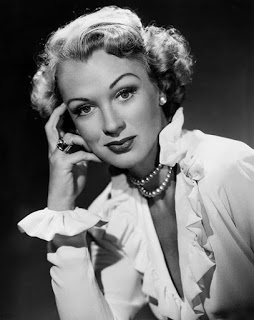
Dunning’s book never even acknowledges Lucille Ball, let alone the Shirley Booth audition. As evident more often today than it used to be years ago, false attribution is now commonplace on Wikipedia. Many people (though not all of them) who submit information on Wikipedia have, on numerous entries for old-time radio programs, deliberately puffed up the credentials or credibility of a source to enhance an argument that was not accurate to begin with.
This is not to say Lucille Ball was not proposed for the role of Connie Brooks at one time but, at present, nothing has been found to verify this claim beyond internet blogs and Wikipedia. News blurbs in a number of industry trade papers, however, claim Joan Blondell was immediately up for consideration following Booth. The April 21, 1948, issue of Variety reported that Shirley Booth was no longer involved and “CBS is now trying to line up Joan Blondell instead.” One week later, on April 28, Variety provided a follow-up: “Negotiations for Joan Blondell to step into the lead role of the new CBS comedy initially intended for Shirley Booth have been temporarily stalemated. Miss Blondell is embarking on a vaudeville tour with Milton Berle, opening at the Pittsburgh Gardens April 30. Although the deal appears set for her to take on the radio program, it’ll probably mean holding up the audition for a couple of months until she is at liberty again.” (Note how I cited my sources for these factoids, which anyone can verify by consulting April 21 and 28 issues of Variety.)
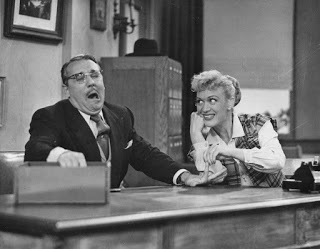
So it seems proper as the new school season begins during this time of the year that we revisit the true origin of Our Miss Brooks, which premiered on CBS Radio, July 19, 1948. Within eight months of its launch as a regular series, the show landed several honors, including four for Eve Arden, who won popularity polls in four individual publications of the time. Not bad when you consider Eve Arden was the third choice to play the title role.
Seven months before the premiere, on December 19, 1947, Shirley Booth was approached by Harry Ackerman, at the time CBS’s West Coast director of programming, to star on a weekly radio comedy. Booth was presently playing the recurring role of Dottie Mahoney on Fred Allen’s radio program, reprising the same Brooklyn accent she emanated on Duffy’s Tavern. The actress played the role of Miss Duffy until 1943 when she divorced Ed Gardner, her real-life husband and star of Duffy’s Tavern. CBS was at that time conducting business deals with numerous radio personalities affiliated with NBC, including Jack Benny and Amos and Andy, and it was William S. Paley’s suggestion that Booth could be shaped into a new radio personality that would dominate prime time.
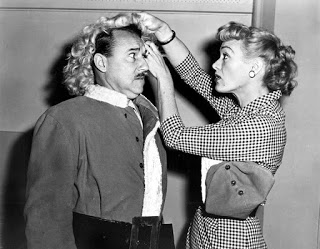 On December 22, Booth agreed — provided the radio program originated from New York City, where she was entertaining offers to do Broadway. Paley personally took control of the negotiations, ensuring the actress that the radio program would be pre-recorded to accommodate her potential stage career.
On December 22, Booth agreed — provided the radio program originated from New York City, where she was entertaining offers to do Broadway. Paley personally took control of the negotiations, ensuring the actress that the radio program would be pre-recorded to accommodate her potential stage career.
By mid-February 1948, Don Ettlinger completed the radio script in which he ensured Paley, “Shirley will get completely away from her Miss Duffy identity, and play the straight role of a school teacher.” The script was twice tweaked by Norman Tokar, script writer for The Aldrich Family, until the last week of March when Edward Downes joined the CBS network staff to produce the radio sitcom and take over direction for Marriage for Two.
On April 9, 1948, an audition was recorded at the studios of CBS. That audition recording exists and today provides us with a fascinating rendition of the program, for comparison, against the Eve Arden broadcasts that were to follow. A few days later, Paley listened to the audition and voiced disapproval on the grounds of Booth’s performance.
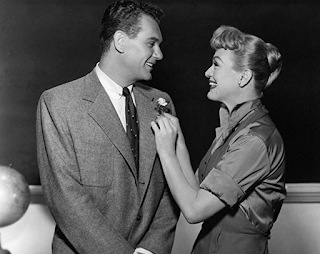 Shirley Booth used her ever-familiar Brooklyn accent and Paley wanted to avoid a New York motif. On April 16, a second audition was recorded with Booth performing without her trademark Brooklyn accent. This led to Booth and Paley exchanging opinions on how she should play the role. Troubles and temperaments abound, which led to Booth walking away and Paley asking Ackerman to seek a new actress for the lead.
Shirley Booth used her ever-familiar Brooklyn accent and Paley wanted to avoid a New York motif. On April 16, a second audition was recorded with Booth performing without her trademark Brooklyn accent. This led to Booth and Paley exchanging opinions on how she should play the role. Troubles and temperaments abound, which led to Booth walking away and Paley asking Ackerman to seek a new actress for the lead.
CBS, meanwhile, was working on a new Cy Howard-inspired program titled Little Immigrant. The audition would be recorded in mid-June 1948 with J. Carrol Naish in the lead; re-titled Life with Luigi in mid-September. Development of new CBS radio comedies were part and parcel of the network’s recent policy to develop in-house without advertising agencies. Paley assured the board at CBS that television was around the corner and programs that build a following on radio would transition well to television. With CBS owning fifty percent, profits were assured. Up until 1947, CBS acted primarily as a conduit between ad agencies and sponsors, providing the facilities for broadcasting at a rental price. Paley wanted the network to own a piece of the action and programs such as Our Miss Brooks was, in his mind, a sure-fire means of accomplishing this goal.
The second actress to be consulted was Joan Blondell, as referenced earlier in this article. To date there has been nothing to lead historians into believing an audition was recorded with Blondell in the role.
In May of 1948, Eve Arden stopped over in Chicago (on her way back from a publicity tour in New York City) to meet with Paley, who was in the Windy City for business. The two dined in the famous pump room of Ambassador East, danced for a spell and discussed the possibility of her starring in a weekly radio comedy. A few days later Arden met with Harry Ackerman and Hubbell Robinson at the Beverly Hills Hotel to read the script. “When they sensed that I wasn’t too interested in the script or in doing radio, they said that two very good new writers, Al Lewis and Joe Quillan, had been given the script and would have a new one for me to read soon,” Arden later recalled. “A week later, Harry took me to dinner at Chasen’s and the script was so vastly improved that I laughed out loud as I read it between courses.”
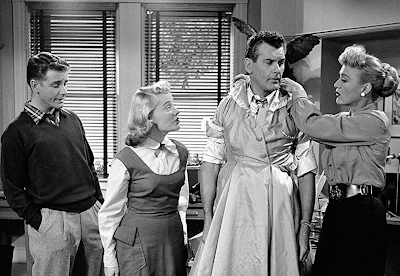
On June 8, 1948, Eve Arden agreed to play the lead role for Our Miss Brooks, signing on the bottom line during that same week. Interestingly, Arden never cut a rehearsal recording or audition until June 23. The initial intention was to launch Our Miss Brooks on July 5, later pushed to July 12 and again to July 19, after producer Larry Berns informed the network that it would take a week or two longer to avoid rushing into production. On July 1, Paley listened to the audition and signed off with his approval, acknowledging Eve Arden was perfect for the role and “an improvement” compared to Shirley Booth. (Both Booth auditions, and the Eve Arden audition features different supporting cast members and a different theme song than we are familiar with today.)
On July 19, 1948, Our Miss Brooks premiered as a sustainer, with the network seeking a sponsor. Colgate reportedly dropped the Kay Kyser show and was seeking a new program, including a radio version of I Remember Mama under development. Our Miss Brooks was heavily pitched to the ad agency representing Colgate, with a proposed $8,000 weekly price tag (plus agency commission). The company responsible for tooth paste signed on as a sponsor after listening to the first three broadcasts and a careful review of the ratings that were steadily climbing.
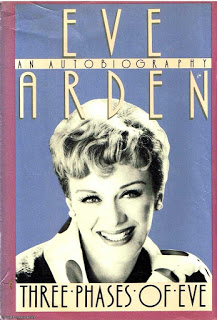 “The only problem was that I’d planned to spend the summer in Connecticut with my kids,” Arden later recalled, “at the Amsters’ farm. I said if they could tape the 13 scripts before I left, it would be fine… one day Frank Stanton, then president of CBS, called me at the Amsters’ farm and said, ‘Congratulations!’”
“The only problem was that I’d planned to spend the summer in Connecticut with my kids,” Arden later recalled, “at the Amsters’ farm. I said if they could tape the 13 scripts before I left, it would be fine… one day Frank Stanton, then president of CBS, called me at the Amsters’ farm and said, ‘Congratulations!’”
“‘For what?’ I asked.”
“Our Miss Brooks is the number one program on the air,’ he answered.”
Showing no hard feelings against Shirley Booth, at Paley’s suggestion, CBS made the actress a firm offer for the weekly supporting role of Jane Stacy on My Friend Irma, to replace Joan Banks. The letter, dated October 10, 1948, offered Booth 13-week cycles after an eight week “probationary” period. Cathy Lewis, who played the role of Jane Stacy, was on leave by doctor’s orders and Joan Banks was merely filling in temporarily. By this time Booth had signed for Goodbye, My Fancy, set to premiere on November 17, and required free time to participate in rehearsals. She declined the offer. (Booth would ultimately receive her first Tony Award for Best Supporting or Featured Actress (Dramatic) for her performance as Grace Woods in Goodbye, My Fancy.)
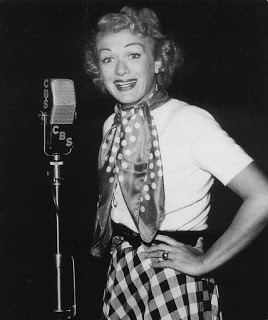 Eve Arden never won a Tony Award but she would receive numerous awards for her role as Connie Brooks on both the radio and television renditions of Our Miss Brooks. She won a radio listener’s poll by Radio Mirror magazine as the top-ranking comedienne of 1948-49. A winter 1949 poll of newspaper and magazine radio editors taken by Motion Picture Daily named her the year’s best comedienne. According to the Museum of Broadcast Communications, she was made an honorary member of the National Education Association and received a 1952 award from the Teacher College of Connecticut’s Alumni Association “for humanizing the American Teacher.”
Eve Arden never won a Tony Award but she would receive numerous awards for her role as Connie Brooks on both the radio and television renditions of Our Miss Brooks. She won a radio listener’s poll by Radio Mirror magazine as the top-ranking comedienne of 1948-49. A winter 1949 poll of newspaper and magazine radio editors taken by Motion Picture Daily named her the year’s best comedienne. According to the Museum of Broadcast Communications, she was made an honorary member of the National Education Association and received a 1952 award from the Teacher College of Connecticut’s Alumni Association “for humanizing the American Teacher.”
Just three months ago CBS finally released the first season of the TV series. We can only hope for Season Two in the near future.
MYTH DEBUNKED
Debunking another myth that has is circulating on the Internet, Eve Arden’s adopted daughter, Connie, was never named after the character Arden played on radio. Connie was adopted months before Arden was even approached to play the role of Connie Brooks, schoolteacher, and Arden’s own confession in her autobiography verifies this: “I named the baby Connie, for my friend Connie Raffetto.”
TRIVIA
For amusement, check out the November 1, 1948, broadcast of Let George Do It, titled “The Flowers That Smelled of Murder.” Jeff Chandler, as fans of the radio comedy know, played the role of Mr. Boynton on Our Miss Brooks, and plays a brief role in the detective story. In this episode, a co-ed suspects that her professor of botany is about to be murdered. Jeff Chandler played the naïve, bashful biology teacher talking with George Valentine’s pretty assistant (whose name is Miss Brooks).
Hollywood 360 Schedule
8/7/21
The Adv. of the Thin Man 10/10/43 Case of the Wandering Corpse
The Red Skelton Show 3/26/50 Flying Saucers
Escape 2/21/50 The Red Mark
Fort Laramie 4/22/56 The New Recruit
The Shadow 3/12/44 Death to the Shadow
8/14/21
Dragnet 7/14/49 The Red Light Bandit
The Cisco Kid 1950s Night of the Fire
The Jack Benny Program 5/2/48 w/ guest, Frank Sinatra
Jeff Regan, Investigator 1/25/50 The Barefoot Boy with Shoes Gone
The Green Hornet 11/23/39 The Smuggling Racket
8/21/21
The Fat Man 10/3/47 A Window for Murder
The Life of Riley 11/5/48 Comic Books
Nick Carter, Master Detective 10/25/43 An Angle on Murder
The Burns & Allen Show 1/30/47 w/ guest, Bea Lillie
Gunsmoke 1/3/53 Westbound
8/28/21
The Line-Up 4/24/51 The Bromell & Bellowe Bloody Bullet Case
The Great Gildersleeve 1/10/43 Fibber & Molly Visit
Rocky Jordan 7/24/49 The Coward of Mutakhan
Our Miss Brooks 7/24/49 Mrs. Davis’ Pensacola Popovers
Philo Vance, Detective 1/25/49 The Idol Murder Case
© 2021 Hollywood 360 Newsletter. The articles in the Hollywood 360 Newsletter are copyrighted and held by their respective authors.

